Tag: garrett
Maryland Sets 51 Youth Fishing Rodeos for 2025
The Southern Maryland Chronicle
ANNAPOLIS, Md. — The Maryland Department of Natural Resources is ready to make waves in 2025, rolling out 51 youth fishing rodeos across the state for kids ages 3 to 15. From the first blooms of spring to the crisp days of late fall, these free events aim to hook young anglers—whether they’re casting their first line or sharpening seasoned skills—in a tradition that’s been reeling in Maryland families for over six decades. Spanning 16 counties, the rodeos promise a blend of excitement, education, and a chance to connect with nature, often set against the backdrop of Maryland’s sprawling State Parks.
This isn’t just about fishing—it’s about legacy. Some of these rodeos trace their roots back to the 1960s, sparked by a vision to give kids a safe space to learn the art of angling while planting seeds of environmental care. Last year, the program drew over 3,300 young participants, a splashy success that’s buoyed DNR’s plans for 2025.
A young angler with his catch during a 2024 youth fishing rodeo near Easton. Maryland DNR photo.
Partnering with dozens of local organizations—from community clubs to park rangers—they’re staging events at ponds, lakes, and streams statewide, backed by the U.S. Fish and Wildlife Service’s Wildlife and Sport Fish Restoration Program. That federal funding keeps the rodeos free, ensuring every kid gets a shot at the water.
Picture this: a sunny morning at Patapsco Valley State Park, a 5-year-old gripping a rod as a sunfish tugs the line, or a 14-year-old at Tuckahoe State Park perfecting a cast under a volunteer’s watchful eye. The rodeos teach more than technique—knots, baiting, patience—they instill a respect for the ecosystems that sustain Maryland’s waterways.
In 2022, DNR stocked over 6,000 hybrid sunfish and trout for these events, per agency records, tipping the odds toward a catch. No license needed for those under 16, though adults and teens can grab one online or at agents, with every dollar fueling conservation efforts like habitat restoration and fish stocking.
The schedule’s a county-by-county haul—Garrett’s mountain streams, Worcester’s coastal flats, and everywhere in between. But some venues cap attendance, so DNR’s nudging families to hit the website, register via listed contacts, and double-check for weather-driven shifts. Last fall’s downpours bumped a few 2024 dates, a heads-up to stay sharp. Events often come with perks—loaner rods, bait, even snacks at spots like Cunningham Falls—making it low-stakes fun with high rewards.
Maryland’s fishing heritage runs deep, from the Chesapeake Bay’s bounty to Deep Creek Lake’s quiet shores. With over 500 miles of fishable streams and countless ponds, per DNR’s maps, the state’s a natural stag
Garrett College spring headcount grows 8%
Number of spring credit students is highest since 2016
McHenry, MD – Garrett College recorded its highest total of spring semester credit students in nine years this semester, according to data released by the College’s Office of Records and Registration (ORR).
GC has 677 credit students this spring, an increase of eight percent, the highest since the College enrolled 693 students in spring 2016. This spring’s enrollment is the second-highest headcount in the last 12 years.
“We’re very pleased to see enrollment continuing to grow,” said Dr. Richard Midcap, Garrett College’s president. “With spring enrollment now finalized, we’ve seen credit enrollment growth for three consecutive fiscal years.”
Total spring credit hours taken by Garrett’s students increased 8.4 percent, rising from 5,650.50 in spring 2024 to 6,126.50 in spring 2025. That’s the highest total since spring 2020, when the College logged 6,190.75 spring credit hours.
The College’s headcount enrollment has grown 28.7 percent over the last four years, according to ORR data. GC’s spring credit hours increased 23 percent over the same four-year time period.
“Our student headcount is almost 12 percent higher than spring 2020, which was our last pre-COVID semester,” said Dr. Robert “JR” Kerns, GC’s dean of student affairs. “That’s really quite an achievement.”
Kerns said new academic programs, including sport management, and expansion of the College’s intercollegiate athletic program have both played roles in GC’s enrollment growth.
“We’ve been intentionally trying to expand opportunities that provide enrollment growth potential,” said Kerns, adding he expects the radiologic technology program that launches in June and the men’s soccer program that starts in August to further expand enrollment.
Ongoing increases in the number of High School Dual Enrollment (HSDE) students is helping to drive headcount increases, according to Dr. Kelli Sisler, GC’s director of institutional effectiveness.
“HSDE grew almost 15 percent from last spring to this spring,” said Sisler, noting that the Garrett College Scholarship Program continues to fund HSDE. “The five-year trend data is even more impressive – there has been an 85 percent increase in the number of HSDE participants this spring compared to spring 2020.”
Professor Christa Bowser, GC’s chief academic officer, said implementation of The Blueprint for Maryland’s Future by Garrett County Public Schools (GCPS) and Garrett College has played a key role in expanding HSDE.
“The Blueprint emphasizes public schools and colleges working collaboratively to offer high school students a dual enrollment option, which GCPS and the College have worked extensively to provide,” said Bowser. “GCPS and the College already had a close working relationship, but the Blueprint sparked an even higher level of collaboration.”
GC’s part-time student population hit an all-time high this spring with 369 part-time students, which Bowser said is largely due to the increase in HSDE.
Garrett County Chamber Of Commerce What's Happening In Garrett County
Garrett County Chamber of Commerce
March 19 - March 25, 2025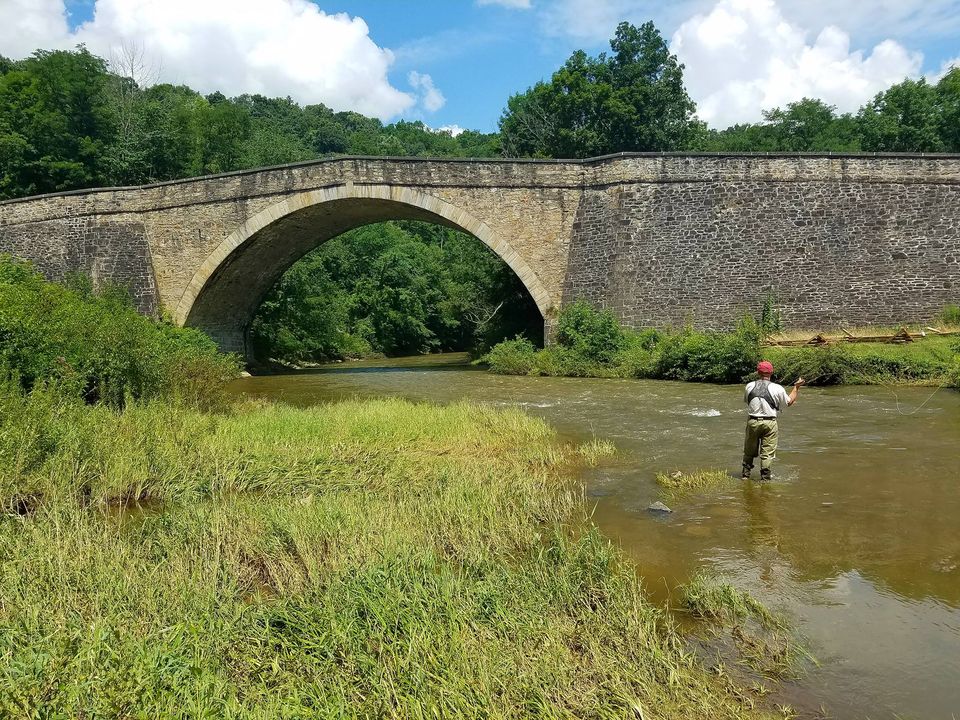 |
 |
 |
March 20 | 5:30 pm - 9:00 pm "Jameson for Your Jigs" Event at Shamrock Whiskey & Cigar Bar624 Humbert School Rd, Rockwood, PA.Enjoy food and drinks from Emerald Isle as Jameson hosts our Irish fest. Sampling & Cocktail Hour begins at 5:30 with Dinner at 6:45pm. Hosted by Shamrock Whiskey & Cigar Bar and Southern Glazers Wine & Spirits.5:30 - 6:30 Irish Whiskey tasting & Cocktail hourEnjoy samples from Jameson, Redbreast, & Green Spot or a Specialty Cocktail created to feature each Irish WhiskeyDinner at 6:45pmIncludes: Irish Pub Salad, Baked Oysters, Braised Beef Short Rib, Plum & Cream CobblerTickets are $75 each which includes dinner, tasting, tax & gratuity.Cash Bar available for anything additional.There will be prizes & giveaways from our Irish Whiskey Sponsors!!Click here for tickets: https://square.link/u/qGmSEO1p |
 |
March 20 | 6:00 pm - 7:00 pm Deep Creek Lake Lecture Series Performing Arts Center at Garrett College, McHenry, MD.Join us for our Deep Creek Lake Lecture Series every Thursday in March 2025, 6pm at the Performing Arts Center at Garrett College. The lecture topics are:-Operation of the Deep Creek Hydroelectric Power Station (Brookfield Renewable)-History of Real Estate around Deep Creek Lake (Karen Myers)-Fishing on and around Deep Creek Lake (TBD)-Wildlife and Habitats of Deep Creek Lake (DNR TBD)Follow us for the exact schedule and more details on each lecture!More info on the Deep Creek Lake Centennial including more events, projects, an interactive timeline and more available at https://dcl100.com/ Free Admission. |
 |
March 20 | 6:00 pm - 8:00 pm Community Pottery ClassDeep Creek Pottery, 1550 Deep Creek Drive, Suites C & D, McHenry, MD.We will offer a series of 5 classes that will include the pinch, coil, slab methods and an introduction to the pottery wheel! Every Thursday evening from 6:00-8:00PM for 5 weeks $200.00 per student includes all glazes and firings! $25.00 registration fee to hold your space! The balance due at the first class! Click on ticket link to pay your registration fee! https://square.link/u/ZpkXCsQg |
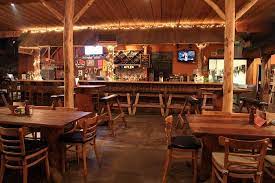 |
March 20 | 6:30 pm - 8:30 pm Team Trivia Mountain State Brewing Company, 6690 Sang Run Rd, McHenry, MD.Team Trivia every Thursday, free to play! Contact information: 301-387-3360. |
 |
March 21 | 6:00 pm Game NightVarious Locations.Join us for Game Night every Friday night at various locations. Starts at 6pmCheck on our Garrett Gamers page on Facebook to see location and information. Free Admission.Contact Information: shepherdDCL@gmail.com. |
 |
March 21 | 4:30 pm - 6:30 pm St. Peter's Fish DinnersSt. Peter the Apostle Catholic Church and Parish Center Hall, 208 S. Fourth St., Oakland, MD.Friday Fish Dinners at St. Peter the Apostle Catholic Parish!Everyone's favorite tradition is back . . . Enjoy a BIG fish dinner with your family and friends at St. Peter's in Oakland, Fridays during Lent (March 7 – April 11). Dine-in and Carry-out meals are available.Prices:$13 adults$6 children (ages 12 and under)$7 fish sandwich onlyMenu and event details can be found at garrettstpeter.com/fishdinners.All are welcome! |
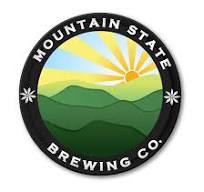 |
March 23 | 1:00 pm - 3:00 pm Team BingoMountain State Brewing Company, 6690 Sang Run Road, McHenry, MD.Team Bingo every Sunday at 1pm!Contact information: 301-387-3360. |
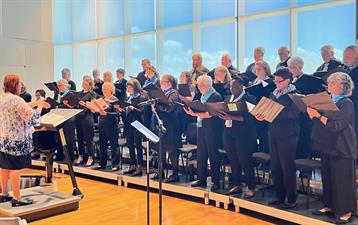 |
March 23 | 2:00 pm - 4:00 pm Community Choir Rehearsals ScheduledSt. Mark's Lutheran Church, 2nd Street, Oakland, MD.Community Choir Rehearsals Scheduled.Love to sing? Consider joining the Garrett Choral Society! Spring rehearsal season is underway on Sundays from 2-4pm at St. Mark's Lutheran Church in Oakland. This is our 46th year of presenting vocal music to the community. Feel free to stop by or email garrettchoralsociety@gmail.com for more information. The concert date is May 18 at 3pm in the Performing Arts Center at Garrett College.$20 membership fee. |
 |
March 23 | 4:00 pm California Wine Dinner at Cornucopia146 Casselman Rd, Grantsville, MD.Experience five courses of wines from Gundlach Bunschu led by winemaker Joe Uhr alongside elevated pairings from Chef Martin Galloway, CEC. One of California's oldest wineries, Gundlach Bunschu wines are produced at the prolific intersection of the Sonoma Valley, Carneros, and Napa Valley appellations, and are Regenerative Organic Certified. $125pp plus tax or gratuity, reservations essential with 50% deposit.Visit thecornucopiacafe.com for complete menu details. |
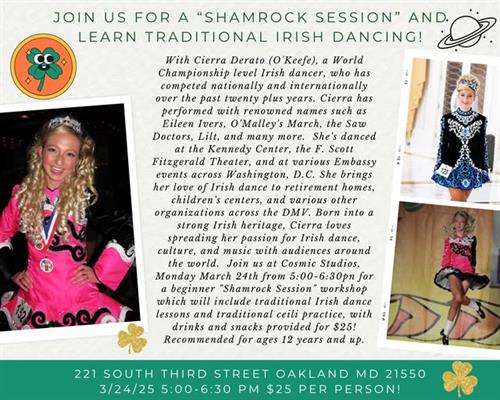 |
March 24 | 5:00 pm - 6:30 pm "Shamrock Session" Irish Dancing Workshop at Cosmic StudiosCosmic Studios, 221 South Third St., Oakland, MD.Join us for a "Shamrock Session" and learn traditional Irish dancing with Cierra Derato (O'Keefe), a World Championship level Irish dancer, who has competed nationally and internationally over the past twenty plus years. Cierra has performed with renowned names such as Eileen Ivers, O'Malley's March, the Saw Doctors, Lilt, and many more. She's danced at the Kennedy Center, the F. Scott Fitzgerald Theater, and at various Embassy events across Washington, D.C. She brings her love of Irish dance to retirement homes, children's centers, and various other organizations across the DMV. Born into a strong Irish heritage, Cierra loves spreading her passion for Irish dance, culture, and music with audiences around the world. Join us at Cosmic Studios, Monday, March 24th from 5:00 - 6:30 pm for a beginner "Shamrock Session" workshop which will include traditional Irish dance lessons and traditional ceili practice, with drinks and snacks provided for $25! Recommended for ages 12 years and up. |
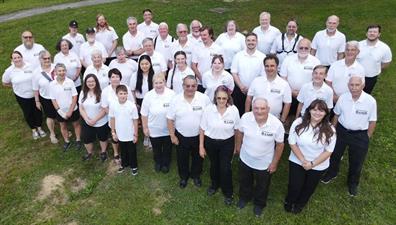 |
March 25 | 7:00 pm - 8:30 pm Community Band Rehearsals Open to New MembersPerforming Arts Center at Garrett College, McHenry, MD.It’s Spring rehearsal season for the Garrett Community Concert Band! Weekly rehearsals are in progress for the upcoming concert on Sunday afternoon, April 27. New players, both young and old, are welcome to join the band. Auditions are not required, but experience playing a band instrument is recommended. Practices are held from 7-8:30 pm on Tuesday evenings in the Recital Hall at Garrett College’s Performing Arts Center. Come give us a try! Email garrettconcertband@gmail.com for more information. |
County Commissioners Announce Public Meeting Agenda
Garrett County Government
Board of County Commissioners
Meeting will also be Live Streamed at https://www.facebook.com/garrettcountygovernment/
The Board of County Commissioners may close a portion of this public meeting and move into Executive Session to comply with a specific constitutional, statutory, or judicial requirement that may prevent public disclosure about a particular proceeding or matter.
*To comment on agenda items – please send to @garrettcountymd.gov3:00 Administrative Session
Board Appointments – Garrett County Local Emergency Planning Committee
Backbone Housing, Inc. – Request for Fiscal Year 2026 County Property Tax Abatement
Mr. Null will review a number of administrative and managerial matters under his authority and jurisdiction with the Board of County Commissioners
4:00 Call to Order of Public Session, Invocation, and Pledge of Allegiance
County Administrator – Additions/Deletions to Public Meeting Agenda
Approval of Public, Administrative, and Executive Meeting Minutes 4:05 Recognition: Callis Auto Detailing – 35th Anniversary
4:10 Garrett County Department of Financial Services – Purchasing Division
Bid Awards: Bid #25–0206 Pump Station 1–1 / 2–1
Bid #25–0306 Galvanized Steel Modular Panel Truss4:15 PUBLIC HEARING: Garrett County Department of Community Development & Planning - Garrett County Water & Sewer Master Plan 2014 – Amendment #5 – To Incorporate Critical Infrastructure Improvements
4:25 Public Commentary
ADJOURNMENT OF PUBLIC SESSION4:30 FISCAL YEAR 2026 BUDGET PRESENTATIONS:
Garrett County Community Action Committee, Inc.
Garrett County Chamber of Commerce
Ruth Enlow Library of Garrett County
Public issues or concerns that are to be presented to the Board of Garrett County Commissioners during any Public Meeting should be scheduled with Carol A. Riley–Alexander, Executive Assistant to the Board of County Commissioners/County Administrator. The Board of Garrett County Commissioners’ next scheduled Public Meeting will be on Monday, April 7, 2025 at the Garrett County Courthouse beginning at 4:00 PM.
A Bridge Too Far in Western Maryland; the fight for hemlocks and history continues
In the far western corner of Maryland, Steve Storck (photo above) keeps fighting for the old hemlocks in Swallows Falls State Park. As I reported a couple of months ago, the plan to replace a single-lane bridge over the Youghiogheny River, near the entrance to the park, with a wider parallel span would cut into a grove of hemlock trees, some of them more than a century old. Storck, a nearby landowner and champion of the river and forest, has been trying to convince the state that the new bridge is unnecessary — certainly not worth the cutting of potentially hundreds of trees.
If the 150-foot bridge must be replaced, he argues, then Garrett County should build the new one where the present one stands. That would cause a road closure, but it would save the trees and what Storck calls the historic nature of the area, including parts of a road and trail established during the Great Depression by the Civilian Conservation Corps.
“The bridge is to be replaced with a concrete highway-style bridge 100 feet closer to Swallow Falls [State Park], destroying historic resources and clearing five percent of the [historic] Youghiogheny Grove old-growth forest,” he says.
The current bridge, a steel truss, appears to be in good shape, bearing the weight of, on average, 400 to 465 vehicles a day, according to a study submitted to the state.
If you’ve been to Swallow Falls, you know that the bridge requires drivers approaching from one side to yield to oncoming motorists. As a long-time visitor to Swallow Falls, I’ve always found the bridge a quaint traffic-calming measure. It requires you to slow way, way down, which puts you in a good frame of mind as you enter the park.
Nobody asked me, and you can call me a tree hugger, but I don’t see the urgency in replacing the current bridge.
But Garrett County wants a new one.
Here’s the thing: Parts of the area are within the Youghiogheny Scenic and Wild River Corridor. To allow the county to build a new bridge, the state had to grant an exception, and that’s what DNR Secretary Josh Kurtz did. “The scenic and wild character of the river and corridor as a whole will not be injuriously impacted by the construction of the new bridge,” Kurtz said in a letter approving the plan.
The State Highway Administration also said it sees “no adverse effect.”
But Storck is still fighting and he’s appealing to Marylanders to join him.
“You can help stop this by writing to Elizabeth Hughes (elizabeth.hughes@maryland.gov) at Maryland Historical Trust and asking her to require the county to replace the bridge in its current footprint to save our history and the natural beauty of this treasured park.”
The 25 Best Places To Go In The South In 2025
Where to next? The start of a new year means an empty calendar and endless possibilities for filling it. Whether you intend to check a bucket list destination off your list, or if this is the year you finally take that trip with mom, it’s time to start planning where you want the next 12 months to take you. If you’re seeking inspiration to fuel your wanderlust, we’ve got your covered. Our editors have scoured the South for what’s new, notable, and next in 2025. From have-to-see-to-believe natural wonders to milestone theme park openings to luxury, experiential stays, these are the 25 best places to visit in the South this year. Happy traveling!
Terlingua, Texas
There is no greater pastime in West Texas than simply, and somewhat reverently, ogling one’s surroundings, especially at sunrise and sunset. The rounded walls with clear windows in the spacious camping domes at The Summit at Big Bend ensure you don’t miss either. Each one comes with a king-size bed, air-conditioning and heating, and Wi-Fi. Watch the sun hoist itself over the distant mountains, and later enjoy unmatched stargazing. (The area, including nearby Big Bend National Park and Big Bend Ranch State Park, is an International Dark Sky Place.)
summitbigbend.com; 2500 N Lone Star Mine, Terlingua, TX 79852; 432-220-3383
Chattanooga, Tennessee
With its 25 shiny vintage train carriage rooms, a retro outdoor pool bordered by striped lounge chairs and umbrellas, a caboose turned cantina, and a manicured courtyard, The Hotel Chalet feels a bit like a Wes Anderson movie tucked away behind the historic Chattanooga Choo Choo train station. But this hideaway is all real and becoming one of the city’s most memorable places to stay. The latest addition, the MacArthur Suite, has a private poolside terrace and sleeps up to four. Elsie’s Daughter, the on-site restaurant, is an elegant, candlelit spot that suits the hotel well.
thehotelchalet.com; 92 Choo Choo Avenue, Chattanooga, TN 37408; 423-266-5000
Cape Canaveral, Florida
With 18 decks to wander and the capacity for more than 5,500 guests, Royal Caribbean’s latest cruise ship is essentially a floating city. Star of the Seas will depart from Cape Canaveral, with its maiden voyage planned for August 31. Travelers will have their choice of weeklong Caribbean routes, and all include a stop at Royal Caribbean’s private island, Perfect Day at CocoCay. The boat has eight distinct neighborhoods, including The Hideaway, an adults- only area with a beach-club feel and incredible ocean vistas.
royalcaribbean.com; 866-562-7625
Bentonville, Arkansas
Art in all its glorious forms—visual exhibits, music, film, food, and dance—is embraced at The Momentary, a free contemporary museum that, alongside the Crystal Bridges Museum of American Art, has changed the cultural landscape of Northwest Arkansas. This year, it celebrates its fifth birthday with a big party in February. And on May 16 and 17, the FreshGrass Festival, a showcase of bluegrass and progressive roots music, will return across multiple stages. Past headliners have included Jason Isbell and the 400 Unit and Molly Tuttle & Golden Highway.
themomentary.org; 507 SE E St., Bentonville, AR 72712; 479-367-7500
Clermont, Kentucky
Some things you might see here: a larger-than-life wooden sculpture of a giant resting against a tree, a boardwalk suspended 75 feet above the ground, and a prairie garden surrounded by vibrant redbud trees. The 16,000-plus-acre forest was founded by Isaac W. Bernheim in 1929 to protect native flora and fauna in the watershed. Its latest development, L+A+N+D, represents the intersection of landscape, art, nature, and design through a series of ever-changing and immersive outdoor installations.
bernheim.org; 2075 Clermont Road, Clermont, KY 40110; 502-955-8512
Canyon, Texas
Palo Duro swells over the Caprock Escarpment of the Texas Panhandle with steep-sided walls rising up to 800 feet in a kaleidoscope of colors that seem to shimmer at dusk, drawing photographers from around the world to capture the mirage-like effect. Named in Spanish for this area’s juniper trees, it’s the second-largest canyon in the country, and the accompanying state park spreads out over 30,000 acres. From scenic lookouts, marvel at geological features such as arched natural bridges and fossils from the Triassic period.
tpwd.texas.gov; 11450 Park Road 5, Canyon, TX 79015; 806-488-2227
New Orleans, Louisiana
One of the charms of Preservation Hall is that it has hardly changed since it became a hot spot for jazz in 1961—from the wooden benches to the songs performed in the small concert hall. This year, an ambitious project will keep that history alive while providing room for it to grow. A new space adjacent to the original building will add 7,000 square feet for shows, exhibitions, and more. This building also has a storied past: It was formerly La Spectacle, the city’s first theater, which was built in 1791.
preservationhall.com; 726 Saint Peter Street, New Orleans, LA 70116; 504-522-2841
Montgomery, Alabama
The Equal Justice Initiative’s Legacy Museum and National Memorial for Peace and Justice opened in the first capital of the Confederacy in 2018, drawing people from all over the world. The site, which documents the legacy of slavery in America, uses first-person narratives, art, educational exhibits, and interactive media to tell a comprehensive story. Now the Freedom Monument Sculpture Park finds yet another way to illustrate our country’s fraught history—through large-scale sculptures. The site lies on 17 acres along the Alabama River, a waterway that facilitated the passage of tens of thousands of enslaved workers. Visitors can step inside original plantation dwellings, as well as into replicas of train cars used for human transport. The National Monument to Freedom, the park’s central feature, pays homage to over 4 million formerly enslaved people who won freedom after the Civil War.
legacysites.eji.org; 831 Walker Street, Montgomery, AL 36104; 334-386-9100
Mountain towns have a special kind of strength. Try to knock one down, and be prepared to witness the kind of comeback they make movies about. In Asheville, catastrophic flooding caused by Hurricane Helene in September 2024 has made way for a big year of rebuilding and new growth in 2025. Favorite places like the Biltmore Estate and Omni Grove Park Inn are back up and running, and the beloved Blue Ridge Parkways continues to reopen in stages. But new spots are also moving forward full steam ahead—especially in the city’s accomplished dining scene. Try focaccia sandwiches at Flour Asheville’s new outpost inside S&W Market. Potential New Boyfriend is a cozy-cool wine and dessert bar with a pronounced love for vinyl, and James Beard Finalist Neng Jr.’s has plans for a next-door bottle shop and expansion that will double its dining capacity. Need a sparkling new place to stay? AutoCamp’s timeless glamping airstreams will debut on the banks of the French Broad River in September.
exploreasheville.com
Kingville, South Carolina
Each spring, this park’s resident fireflies create a magnificent display deep in its dense hardwood forest. When dusk descends into darkness, thousands of the insects light up in unison to the beat of some imperceptible drum. Congaree, along with Great Smoky Mountains National Park and Allegheny National Forest, is one of only a handful of places nationwide where you can see these beautiful shows. Due to high demand, you’ll have to score a lottery ticket via the National Park Service’s website, which opens its annual draw at the end of March or beginning of April.
nps.gov; 803-776-4396
Gay, Georgia
There are resorts set in nature, and then there is Quercus. Situated on 3,800 peaceful wooded acres, it was originally founded in the 1970s to be a working farm, cattle ranch, hunting reserve, and home for an Italian duke and duchess. Most of those things remain today, with the addition of four beautifully furnished, expertly designed guesthouses and Uberto, a restaurant with a garden-to-table tasting menu by chef Ryan Smith of Atlanta’s Staplehouse. Take part in activities like horseback riding, kayaking, and fishing on the Flint River, or just enjoy the quiet. Although the property itself is expansive, everything is tailored to a small number of guests, so it feels like a private escape.
worldofquercus.com; 208 Caldwell Street, Gay, GA 30218; 770-884-4434
McHenry, Maryland
Western Maryland is known for its towering mountains and scenic railroad line, making it an obvious choice for a fall getaway. But in McHenry, the sprawling Deep Creek Lake beckons visitors during all four seasons. In summer, the 3,900-acre oasis is abuzz with activity, from boaters to anglers to families just looking to cool off. Autumn brings leaf peepers seeking the intoxicating colors of fall foliage, and in the winter, there’s even ice fishing. To celebrate its 100th birthday, events are planned for nearly every month of 2025. Highlights include a boat parade on June 21, a festival at the fairgrounds on July 19, and a gala on August 23.
Nashville, Tennessee
When a country radio show called the WSM Barn Dance first aired in 1925, no one could have imagined that it would evolve into Nashville’s most legendary showcase for musicians. Over the past 100 years, the Mother Church of Country Music has seen every evolution of the genre, from Bill Monroe to up-and-comers like Charley Crockett. To celebrate, the Opry 100 will offer a year of special tours, tribute concerts, debut performances, and more.
opry.com; 600 Opry Mills Drive, Nashville, TN 37214; 800-SEE-OPRY
Winston-Salem, North Carolina
If you’re looking for the ultimate springtime day trip, go to the Reynolda House Museum of American Art, Reynolda Gardens, and Reynolda Village, located on and around Wake Forest University. The property and former country home of R.J. Reynolds and Katharine Smith has a multitude of things to see and do on its 1,067 acres. Stroll the formal gardens, which include flowering bulbs, azaleas, and the largest cherry tree display in the Carolinas. Don’t miss the restored 1913 Lord & Burnham Greenhouse. Tour the 64-room Reynolda House Museum of American Art, with its period interiors and galleries of paintings and other works. Then enjoy a meal and shopping at Reynolda Village, a retail area housed in historic buildings.
reynolda.org; 2250 Reynolda Road, Winston-Salem, NC 27106; 888-663-1149
Oklahoma City, Oklahoma
From Bricktown to Automobile Alley, the Sooner State capital is a destination defined by its neighborhoods. Now the Horizons District is set to make a massive splash thanks to a forthcoming $400 million development next to the First Americans Museum, which opened in 2021. The 175,000-square-foot facility offers an immersive and educational experience built around the stories of Oklahoma’s 39 tribal nations. In February, Okana Resort & Indoor Waterpark will join it, adding a riverfront hotel, an amphitheater, retail options, a spa, restaurants, a family entertainment center, and a water park. Guided by the Chickasaw Nation, Horizons’ blend of entertainment and education hopes to serve as a model for more meaningful projects to come.
South Florida
This peninsula may be a slim strip of land, but it’s undergoing a hotel boom. The Amrit Ocean Resort & Residences is a luxury property that aims to be a wellness destination. In the four-story spa, you can get a massage or a facial, as well as treatments like hydrotherapy and chakra balancing. The Singer Oceanfront Resort (above) offers pool cabanas, bike rentals, and food and drinks you can enjoy right by the water. And a renovation at the Palm Beach Marriott Singer Island Beach Resort & Spa has added a Mediterranean restaurant, Ona Coastal Cuisine.
LaGrange, Georgia
You’re likely familiar with Callaway Resort & Gardens, the azalea-filled property in Pine Mountain, Georgia. Founded in 1952 by textile magnate Cason J. Callaway and his wife, Virginia, it has grown to include restaurants, a lodge, a spa, and more. But the Callaway legacy doesn’t end there. About 40 minutes away is a lesser-known yet equally beautiful treasure—their former family home, Hills & Dales Estate. The 1916 Georgian-Italian villa is famous for its boxwoods, camellias, and orchids. Its 1841 grounds are considered some of the best-preserved 19th-century gardens in America. With plants and flowers to view in every season, it’s a wonderful place to explore. The house, which contains much of the original furniture and art, is also open to the public.
hillsanddales.org; 1916 Hills and Dales Drive, LaGrange, GA 30240; 706-882-3242
Richmond, Virginia
The latest offering from the Ash hotel group, Shenandoah Mansions, will open in April. As with sister properties Hotel Peter & Paul in New Orleans and Ulysses in Baltimore, a stay here is meant to be a memorable experience. American folk art inspired much of the design, which has hand-painted tiles and block printed quilts. History plays a role too: Some rooms, like the Lady Estelle suite, are named for area leaders, such as the late social activist Virginia Estelle Randolph.
ash.world/hotels/shenandoah-mansions; 501 N. Allen Ave., Richmond, VA 23220; 804-381-0099
Orlando, Florida
Set to open in May, Universal Epic Universe has five worlds that together offer 50 unique experiences. Guests will go through the Chronos portal into the Celestial Park, featuring a constellation-themed carousel, an interactive fountain and splash pad, and a dual-launch coaster called Stardust Racers. Four more portals lead to The Wizarding World of Harry Potter—Ministry of Magic, How to Train Your Dragon—Isle of Berk, Super Nintendo World, and Dark Universe. Stay inside the resort at the Universal Helios Grand Hotel.
universalorlando.com; 1001 Epic Blvd., Orlando, FL 32819; 407-363-8000
Pigeon Forge, Tennessee
It might sound strange, but up until recently, Dollywood was a little short on the country star herself. Sure, her spirit and songs permeate every corner of the famous park, but since its museum, Chasing Rainbows, closed in 2021, there hasn’t been an area dedicated to all things Dolly. Thankfully, a new attraction remedies that and then some. Three times the size of the old museum, it tells her story through three interactive exhibits: Songteller (her life and career), Behind the Seams (her iconic style and wardrobe), and Precious Memories (a tribute to her friends and family).
Big things are on the horizon for Kentucky’s second-largest city as it marks a milestone birthday. In June, it will host Come Home Month with a series of special happenings headlined by SoulFeast Week, a 10-day celebration of Black chefs, restaurateurs, and farmers. In the fall, Keeneland, a historic racetrack and the world’s largest Thoroughbred horse auction house, will debut a three-level paddock building along with additional hospitality venues. The $93 million undertaking will include panoramic rooftop views and dining options.
Whitwell, Tennessee
Glamping is extremely popular, and Bolt Farm Treehouse continues to expand the definition of this type of stay. In addition to tree houses, domes, and mirror cabins (tiny homes with floor-to-ceiling windows made of reflective glass), the property atop Whitwell Mountain plans to open a spa—complete with stone hot spring pools, a cold plunge pool, mirrored sauna, steam room, and yoga deck—this quarter. Choose from a menu of facial and body treatments, and then enjoy the vast scenery—from here, you can see three states. Afterward, if you’re feeling hungry, meals made by private chefs can be arranged.
boltfarmtreehouse.com; 423-556-3365
Brooksville, Florida
The Cabot Collection includes luxury golf resorts in Canada, St. Lucia, France, Scotland, and now a small town about an hour north of Tampa. Cabot Citrus Farms, the newest addition to the brand’s portfolio, has two 18-hole courses and two shorter ones (the 11-hole option is lit up at night). Located on Florida’s Nature Coast, the property is a picturesque landscape of pine, palmetto, and oak trees among sandy dunes. Between rounds, golfers can access multiple dining options; a sporting club; and The Porch, a hangout area with cornhole, bocce ball, croquet, and more. Guests who want to make it a weekend can choose from two- and four-bedroom cottages complete with kitchens and patios.
cabotcitrusfarms.com; 17590 Ponce De Leon Boulevard, Brooksville, FL 34614; 352-796-5500
Shelbyville, Tennessee
With 202 stools and a counter spanning 518 feet, the bar at Humble Baron is so long it set a Guinness World Record. The sight of it alone is enough of a reason to grab a drink here, but this place is historic in more ways than one. It is located at Nearest Green Distillery, named for Nathan “Nearest” Green, the first known African American master distiller. While Jack Daniel is a name even teetotalers recognize, fewer people know that Green taught Daniel how to make whiskey and later became his first master distiller. (You can read all about it in the fascinating book Love & Whiskey by Fawn Weaver, founder of the Uncle Nearest brand.) Green would likely be proud of the award-winning bottles being produced today. You can taste them at Humble Baron, where beverage director Akinde Olagundoye and his team mix up classic cocktails and create new ones.
humblebaron.com; 3125 US-231, Shelbyville, TN 37160; 931-909-6610
Meadows of Dan, Virginia
Although it’s been open since the early 2000s, the 12,000-acre property, part of the Auberge Resorts Collection, recently unveiled a significant overhaul by Chad Dorsey Design. Dorsey, drawing on his Tennessee roots, hit refresh on the lodge’s public spaces, including the stately great hall; the study; and Leatherflower, a restaurant that serves breakfast and dinner daily. The menu takes guests on a culinary journey through Appalachia and the South with dishes like smoked trout hush puppies and roasted halibut with grits and andouille vinaigrette. With its rustic exposed beams, antiques, and layered fabrics (like plaid banquettes and floral grass cloth wall coverings), the restaurant feels like a taste of Europe in the Blue Ridge Mountains. And there’s another new offering: two tree houses where you can admire the breathtaking landscape.
aubergeresorts.com; 2000 Busted Rock Road, Meadows of Dan, VA 24120; 276-222-6837
County Commissioners Announce Public Meeting Agenda
Garrett County Government Board of County Commissioners
PUBLIC MEETING AGENDA
Tuesday, January 21, 2025
Agenda Session Times are Approximate
Meeting will also be Live Streamed at https://www.facebook.com/garrettcountygovernment/
The Board of County Commissioners may close a portion of this public meeting and move into Executive Session to comply with a specific constitutional, statutory, or judicial requirement that may prevent public disclosure about a particular proceeding or matter.
*To comment on agenda items – please send to @garrettcountymd.gov
3:00 Administrative Session
- Appointments
– Ruth Enlow Library of Garrett County – Five (5) year terms
–Justice Reinvestment Commission – Garrett County Representative
–Emergency Services Board – Two (2) year terms
- Mr. Null will review a number of administrative and managerial matters under his authority and jurisdiction with the Board of County Commissioners
4:00 Call to Order of Public Session, Invocation, and Pledge of Allegiance
County Administrator – Additions/Deletions to Public Meeting Agenda
Approval of Public, Administrative, and Executive Meeting Minutes
4:05 RECOGNITION:
- Lou Battistella – Service on the Garrett County Emergency Services Board
- Mtn. Laurel Medical Center – Grantsville Location – 10th Anniversary
4:10 Garrett County Department of Financial Services – Purchasing Division
Bid Awards:
- Request for Proposals #24–1029 – Design/Build Services – Keyser’s Ridge Business Park Speculative Building
- Bid #24–1031 McHenry Lions Club Pavilion Project
4:10 Garrett County Department of Community Development
- Resolution 2025 – 1 – Sale of Property to Suncap Property Group, LLC
- Resolution 2025 – 2 – Sale of Property to Sunrise Sanitation Services, Inc.
- Resolution 2025 – 3 – Sale of Property to CHIPS Properties, LLC
4:20 Garrett Transit Service Transportation Reduction Concerns
4:30 Public Commentary
ADJOURNMENT
Public issues or concerns that are to be presented to the Board of Garrett County Commissioners during any Public Meeting should be scheduled with Carol A. Riley–Alexander, Executive Assistant to the Board of County Commissioners/County Administrator.
The Board of Garrett County Commissioners’ next scheduled Public Meeting will be Monday, February 3, 2025 at the Garrett County Courthouse beginning at 4:00 PM.










